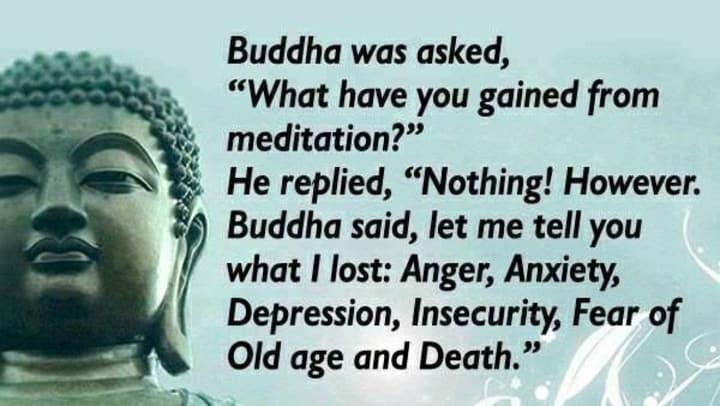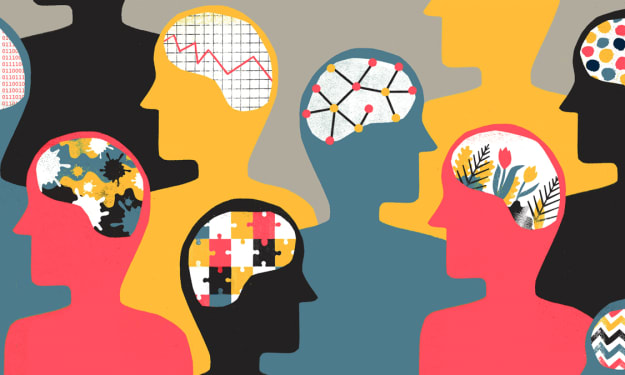10 Reasons Why You Should Not Meditate for Optimal Health
Understand the truth and mystery of the benefits of meditation.

Meditation can seem like it's unattainable to some, and daunting or intimidating to others. The first thought most people think is, "Will it take up all my time or will it actually work and bring results?"
Here's what's the truth when it comes to the meditation. With meditation practices steadily on the rise, it makes sense that there is some confusion out there.
There will subsequently be myths, misnomers and misinformation surrounding anything that is here in the universe to help you heal without the use of anything outside of yourself!
This very article was written to set the record straight.
What are the benefits of meditation?
Meditation training improves a wide range of skills, including attention, willpower, focus, stress management, impulse control and self-awareness. It changes both the function and structure of the brain to support self-control. For example, regular meditators have more gray matter in the prefrontal cortex.
What is the main goal of meditation?
The goal of meditation is to go beyond the mind and experience our essential nature—which is described as peace, happiness, and bliss. But as anyone who has tried to meditate knows, the mind itself is the biggest obstacle standing between ourselves and this awareness.
For over 5,000 years, meditation has been widely used by our ancestors as a mind and body practice that has a long history of results for increasing calmness, physical relaxation, improving psychological balance, high blood pressure, coping with stress, anxiety and even depression. There are a few different types of popularized meditation practiced around the world
They include...
- Breath awareness meditation.
- Mindfulness meditation.
- Breath awareness meditation.
- Kundalini yoga.
- Zen meditation.
- Transcendental Meditation/

7 Reasons Meditation Wont Work For You... If You Do Not Want These Things!
- If you do not want to reduce stress, even though stress reduction is the number one most common reason people learn meditation, then meditation is NOT for you!
- If you do not want to control anxiety, depression or any mental health based issue, then meditation is NOT for you!
- If you do not want to experience optimal emotional health, then meditation is NOT for you!
- If you do not want to enhance your self-awareness, then meditation is NOT for you!
- If you do not want to strengthen or lengthen your attention span, which is the main reason those who have ADHD learn meditation since it increases focus, then meditation is NOT for you!
- If you do not want to fight certain life-threatening addictions or rid yourself of unhealthy habits, then meditation is NOT for you!
- If you do not want to generate automatic kindness but instead want to continue living through the negative ego mind, then meditation is NOT for you!
- If you do not want to reduce age-related memory loss, then meditation is NOT for you!
- If you can not make time for the benefit of your sanity to set aside 10-15 minutes a day out of the 24 hours that we all are given each waking day, then you do NOT want to meditate!
- And last but not least, if you do not want to experience peace of mind with little or no ego attached, then you may NOT want to meditate!
Why do people learn to meditate?
Regardless of an individual's initial reason that gets them started, most people meditate because it helps them to feel good within. Although many people meditate for different reasons: to feel calm, to lessen stress or pain, to get through a crisis, or to engage in a spiritual practice.
How Long Is the Process?
Most people quit before they start because they simply are too busy worrying about results that it becomes a tedious task. This occurs because they focus on the ending point in the very beginning and don't quite end up reaching there.
When we see the goal as being unreachable or pointless, its not long after that the mind starts to shut down and think it's a total waste of time.
When the ego does this do not listen to it. You must learn to challenge yourself in life whenever you feel like giving up. And we should also be weary that if we have small children, they are always watching and learning from our behaviors, which end up being their adult behavior patterns that they will most definitely mirror from their guardians.

What are the main goals of doing Meditation?
There is more than one way to practice mindfulness, but the goal of any mindfulness technique is to achieve a state of alert, focused relaxation by deliberately paying attention to thoughts and sensations without judgment. This allows the mind to refocus on the present moment.
The main focus of meditation is to stop the mind from wandering about in an aimless stream of thoughts. This is why people often say that the aim of meditation is "to still the mind and just 'be.'" And before you know it, the more regularly you practice your meditative regimen, the more you will find yourself always acting from a state of inner peace.
What is the value that meditation adds to practitioners lives?
Stress levels are drastically lowered by over 87% after the third consistent week, and any stress-related factors that control your mood, day or life are completely obsolete. Making it easier for you to maneuver throughout your life easily and effortlessly.
Can meditation change my life?
Meditation will undeniably help you to change your attitude towards life, and it will also provide you with a peace of mind and happiness. And let's face it, who doesn't want that?
It helps you us achieve a better understanding of ourselves as well as others. Since it helps you clear your mind and mental chatter, meditation also improves our concentration levels, memory, and creativity and also makes you feel rejuvenated...
Proven research reported that those who meditated for about 30 minutes a day for eight weeks had measurable changes in gray-matter density in parts of the brain associated with memory, sense of self, empathy and stress. These findings appear in the Jan. 30th issue of Psychiatry Research.

Meditate to Achieve Your Goals
Meditate to achieve your immediate goals. Read the two articles linked below to learn the easy steps of beginning meditation!
Article: meditation quotes to guide you
About the Creator
Silena Le Beau
She expresses her gift of writing through each piece. She studied writing in college and has been inspiring people for 20 years. She gives back to the community & enriches them with enlightenment. Philanthropist, Empath and Nature lover.






Comments
There are no comments for this story
Be the first to respond and start the conversation.